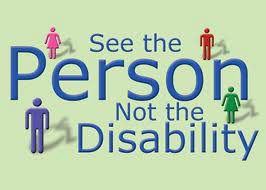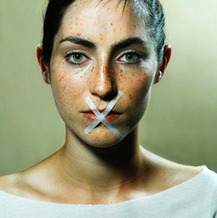Within stuttering communities, the discussion of whether stuttering should be considered a disability is complex. Some stutterers identify as disabled, and some do not. We at Did I Stutter understand dysfluency through the social model of disability, and identify ourselves as disabled. Conversely, the self-help movement is based on a medical model of stuttering and its followers largely reject the idea that stuttering is a disability. Identifying as disabled is a personal decision that should be the right of all stutterers. However, the portrayal of disability in self-help spaces makes clear the influence that speech pathology has on the self-concept of stutterers.
9 Comments
 In art, and especially in writing, disability is commonly used as a metaphor. As a poet, I have heard countless instances in which fluent people use ‘stutter’ figuratively in their work. It happens at least once in most readings and shows. A poet says “love stutters when it gets nervous” or “the kid with the stutter like a skipping record” or “the insistent stutter of my longing” or “the kid’s hands forgot how history stutters new names.” These poets are not referencing dysfluent speech in the same way I do. Rather, they use ‘stutter’ to convey information about a character. Metaphors rely on a shared understanding of a concept, and the lines quoted above only make sense within this context. When a fluent poet says stutter they are referencing the collective understanding that stuttering is indicative of anxiety, dishonesty, incapacity, or inferiority. These analogies persist because stereotypes about dysfluency are so widely shared and firmly held. The writer uses stutter as a metaphor because they know it will concisely and illustratively communicate their intended concept. This is not limited to dysfluency; other disabled voices and bodies are common objects in writing. Almost every abled writer I know has at some point appropriated the language of disability in their work, referring to surprise as paralyzing, fear as crippling, or blindness as ignorant, or comparing capitalism to cancer. Employing references to disability as metaphor relies on a collective understanding that disabled bodies are broken, inferior, less valuable, and that they appropriate for use as objects of comparison. It is important to note that the appropriation of disability occurs by abled writers, who are positively sanctioned for objectifying disabled voices. Disabled speakers writing about themselves and their experiences are less-positively sanctioned. A cliché phrase in poetry slam when facing a particularly challenging competition is “do your cancer poem!”, meaning pull out your best work. Almost never is this a poet who has cancer, but instead a poem about someone else who has died of cancer. This type of cancer poem typically scores very well. Abled writers who use my voice as a metaphor interpret it differently than I do. They aren’t thinking about dysfluency as an identity at all, because they aren’t thinking about dysfluent people. They are looking to describe a nervous character and they settle on ‘stutter’ or they are writing about an abnormal rhythm and are reminded of the way our speech catches in their ears. Using ‘stutter’ as an analogy separates our speech from our bodies, strips it of meaning and nuance, and reduces it to stereotypical repetitions and elongations. Even when the use of stuttering is not directly pejorative – when it is compared to something other than a nervous child, or used in an original way – the decoupling of dysfluency from speech and from the person is incredibly problematic. Fluent writers do not understand the social components of dysfluency, the way that dysfluent people relate to our speech, or the ways that they are complicit in perpetuating stereotypes. Their intention has nothing to do with my voice, but their word choice is born out of ableism and speech discrimination. In critiquing writers who appropriate disability, I am challenging the power that abled writers hold over disability narratives. -Erin  Much of the time, my speech is not noticeably dysfluent. The number of blocks and repetitions I encounter in a given sentence vary by the day, topic, and speaking situation; some days there are a lot, and some days almost none. I do not purposefully augment my speech to mask dysfluency, but it is very common for others to incorrectly perceive my speech as fluent, at least initially. In these instances I am fluent-passing, regardless of my intentions. Passing is a complex component of disabled identity. It comes with a great deal of privilege, which I am careful to remember. My history with stuttering and speech discrimination is my own, and it is greatly influenced by the ease with which I can pass as fluent—the ease with which I can closet my voice. My speech is stigmatized in a similar manner to other stutterers, but often to a much lesser degree. While in a particularly dysfluent period I am reminded of the contrast, how it feels to anticipate ridicule every time I open my mouth. Being fluent-passing means that my dysfluent identity is less visible to the people around me. Stuttering is a thing that I do, and I don’t feel the need to talk about it all that often. Because of this, my friends and co-workers are frequently surprised or confused when they first hear my opinions about dysfluency. They are surprised to learn that I care greatly about the way my speech is perceived, or that the ways they talk about my voice are a type of speech discrimination. I receive a lot of praise from others (especially from poets) for the way that I parse my words. They call me articulate, or compliment my diction. This makes me uncomfortable—in the way that fluent people discussing a dysfluent person’s speech is usually uncomfortable—but also because my praise-worthy diction is the result of two decades of pressure to assimilate. I enunciate the way I do because speech discrimination has taught me that it is the safest way to speak. The variability of my dysfluency increases the pressure I feel to pass in some aspects of my life. I am always disabled, even when others do not hear a stutter. I always have the right to request and receive accommodations related to my speech, but the justification for those accommodations is less apparent. People assume that since I sound fluent one day and dysfluent the next, I am capable of presenting as fluent all of the time. And if I am capable of presenting as fluent, that they have no obligation to respect my dysfluent identity. Everyone communicates in a unique manner; fluent and dysfluent alike, no two people have identical speech patterns. The category of stutterers encompasses a massive range of voices that can really sound quite different from one another. As such, every stutterer experiences stuttering and speech discrimination differently. These experiences are influenced and augmented by intersections of privilege and marginalization in regards to race, gender, class, and sexuality. My voice is my own and it reflects my individual history. I do not claim to speak on the specific oppression of anyone else; rather, I am committed to fighting the speech discrimination that prohibits dysfluent people from being heard. -Erin  As a dysfluency pride project, Did I Stutter adamantly supports the right of individuals to incorporate stuttering as an element of identity formation. To this end, we are aware of the highly politicized language used by others to categorize our bodies and voices. We consciously refer to ourselves as stutterers instead of people who stutter, which is the language preferred and perpetuated by the field of speech-language pathology. Person-first language was originally introduced by disability advocacy groups in the 1980s to fight the dehumanization of disabled people and has evolved into a tool of ableism used to oppress stutterers and inhibit the formation of self-advocacy networks. It employs awkward phrasing that marks stuttering as an undesirable trait and reinforces non-disabled speech as normative. The person-first label ‘person who stutters’ is often abbreviated to PWS. Using acronyms to refer to an individual or group of stigmatized people accentuates the marginalization of that group. These linguistic standards are imposed upon disabled people, although many disability groups are very explicit in their rejection of person-first language (the Deaf, Blind, and Autistic communities, for example). The strongest support for person-first language comes from non-disabled parents of disabled children and clinicians working with the disabled, individuals who are not using the language to refer to themselves. Person-first language is codified in policy by many social work, therapy, and academic organizations, which may require their employees to use it. Many stuttering self-help organizations model person-first language, referring to individuals as people who stutter. These organizations may support stuttering pride and view their members positively, but insisting on person-first language reinforces the message that stuttering is a defect. The tone of these groups is commonly one of minimizing or ‘overcoming’ stuttering, and members are discouraged from adopting dysfluency as an element of identity. Person-first language, with its emphasis on the person and not the disability, is effective in separating disabled people from each other and lessening the strength of community formation. To form communities of political significance, we need to be seen as stutterers (and Autistic people, and wheelchair users, etc.) instead of people who stutter, people with autism, people who use wheelchairs. The distinctions between person-first and identity-first language can seem insignificant to non-disabled people, to whom these labels aren’t applied. While proponents claim that referring to us as people first is more respectful, they dismiss the fact that only stigmatized identities are given person-first labels. We are not expected to call ourselves ‘people with whiteness’ and no one seems worried that our identities will be reduced to our shoe size or eye color. Similarly, non-disabled people are not expected to refer to themselves as ‘people who are not people who stutter’. Some people prefer to be called people who stutter, or people with disabilities. It is their right to choose the language of their identity, and their choice should be respected. That right should be respected among all disabled people. There is no linguistic standard that can be applied so broadly. No person should be burdened with the duty of asserting their humanity as a means of introduction. We are people. To ensure that this fact is not overlooked in discourse about our bodies is not our responsibility. -Erin  The conceptualization of dysfluent speech as ugly or unpleasant is an effective tool in the marginalization of stutterers. It is particularly salient for women, who face intersecting and compounding marginalization in patriarchal society. The appearance, behavior, and speech of women are much more heavily policed. Norms of emphasized femininity dictate that appropriate roles for women are submissive, docile, and aligned with specific standards of physical appearance. Understanding gender-based oppression is critical to discussing the ways that women experience speech discrimination and their role in activism. Patriarchal society praises women for behaving and appearing in ways that accentuate their vulnerability and diminish their confidence. The misconception that stuttering is caused by shyness, anxiety, or low self-esteem is used to reinforce the belief that women are intellectually, emotionally, and psychologically frail in relation to men. A woman’s response to her own stuttering is more positively sanctioned if she expresses shame, and women much more than men are encouraged to suppress stuttering, even at the expense of communication and expression. The gendered differences in perception of confidence among stutterers illustrate an important facet of patriarchy, that the perpetuation of a binary system necessitates the treatment of masculinity and femininity as mutually exclusive categories. Vulnerability and low self-esteem are positively sanctioned in adherence to standards of emphasized femininity, while dysfluent men are negatively sanctioned for expressing shame, as it is a deviant performance of hegemonic masculinity. This type of binary-based double standard is visible in speech and behavior more broadly. For example: similar actions by leaders are labeled as assertive when performed by men and abrasive when performed by women. Emphasized femininity as an embodied practice involves adherence to specific norms regarding physical appearance and self-image. Embodied practices of vulnerability encourage low self-image and the persistent focus on improvement of physical appearance rather than acceptance or pride. It is far more widely accepted for women to participate in and support crash diets and weight loss regimens than campaigns for body positivity or health at every size. Women’s public engagement with stuttering is similarly influenced. Medical-model self-help groups that focus on avoiding stuttering and improving self-acceptance are much more accessible than radical activism, which rejects the notion of stutterers as flawed and demands institutional change. For women, rejecting patriarchal standards of body image and body presentation is itself a radical act. To give up the work of therapy, assimilation, and internalized shame and instead be proud of a dysfluent voice is a highly deviant act. It is much more difficult for women than men to obtain legitimacy when they do not view stuttering as a defect. It is important to account for the effect of gender-based oppression on dysfluent women when considering the experience of stutterers more broadly. It is also important to consider that the experience of trans and non-binary people is different from that of cisgender women. Intersectional analyses must also account for privilege and oppression based on race, class, age, sexuality, and other disabilities. When we talk about ableism and speech discrimination general, abstract terms, the nuance of intersecting oppressions can often be masked. Too often, we talk about pride and activism in ways that do not account for ways we experience privilege, and the ways in which others are oppressed. -Erin “If my stutter was the most truthful and sincere part of me then what did it mean to try and change that voice?”
Stutterer and author Katherine Preston asks this intriguing question in her Huffington Post article citing Honest Speech. How do we discuss the concept of authentic voice in respect to the myriad reasons individuals choose to change the way they speak? It is necessary to first differentiate between alterations related to identity and those related to assimilation, although the two are often intertwined. When we talk about stutterers in speech therapy, we are primarily talking about assimilation. This type of therapy is founded in speech pathology, which labels disabled speech as inferior, ineffective, and impeded. Individuals who pursue therapy are influenced by the socially constructed standard of fluency, and they seek to reconcile the difference in their speech. Commonly, the decision to enter therapy is made not by the individual but by parents and educators who mark dysfluent speech as different and attempt to realign it. Individuals who enter therapy for reasons related to identity are commonly not stutterers. Preston gives many examples of identity-affirming therapy, including trans* and non-binary individuals. In this case, aspects of a person’s speech are misaligned with their identity and they make the choice to pursue change. They seek therapy not to sound like everyone else, but to sound more like themselves. Assimilation and identity can be conflated in many cases. The litigator who entered therapy to deepen her voice did so because a high-pitched voice was viewed as incongruent with her identity as a litigator. However, the perception of femininity as ineffective in the courtroom stems from the social construction of maleness as an unmarked trait. And the choice to align a person’s voice with their gender identity is influenced by the social construction of male and female speech traits. Did I Stutter is not inherently opposed to speech therapy. Our intention is not to shame or judge individuals who pursue therapy for any reason but instead to illustrate the implicit and explicit forces that drive stutterers into speech therapy. The point is to empower dysfluent voices, and to advocate for stutterers to be treated with respect regardless of their choices about therapy. The point is to allow stuttering youth access to proud dysfluent role models and to affirm consent and bodily autonomy at all ages. -Erin It’s been a few weeks since International Stuttering Awareness Day, when Honest Speech was shared by Upworthy. When I chose to perform this poem at the National Poetry Slam in August I never imagined it would reach an audience of this size. While I’m incredibly proud of the poem, and thankful for the video that connected me with Did I Stutter, it is also unsettling to see my work passed around the Internet in ways I can neither predict nor control.
My love of poetry slam comes from the control it grants its performers. For the three minutes I am on stage, I am the loudest thing in the room and I do not fear interruption. The stage, the spotlight, and the microphone all afford a performer the privilege of being heard, which allows more energy to be focused on the content of communication. Onstage I present a nuanced, impassioned argument in a way I am unable to in daily conversation. In going viral, control and nuance are lost. A performance that was full of rage in the moment becomes a cute or interesting video passed around social media. The response this poem elicits is telling. The comment section of most viral poetry videos is lousy with hate speech, but not mine. I expect to receive negative comments, but for the most part I really haven’t. There’s the poet who accused me of faking my stutter for the sake of performance, and the commenter who thought I was lazy for not pursuing fluency, but that’s really the extent of it. And that bothers me. People aren’t getting angry with me, or disagreeing with my work, because they fail to understand the message I am trying to communicate. The consensus among Youtube commenters isn’t that I am a poet writing about stuttering, but that I am a poet despite stuttering. My work is presented as demonstrative of strength and perseverance in a way I really don’t believe is warranted. The term “inspiration porn” refers to this extremely common response to disabled self-expression, in which stories of disabled people excelling in sports, art, or even just performing daily tasks, are marketed for the consumption of the non-disabled. This rhetoric - that it’s inspiring to watch someone overcome hardship - is incredibly infantilizing and reinforces the essentialist notion of the disabled as irreparably different. Watching the work I intend to be angry and radical used in this way is frustrating, to say the least. Some incredible conversations within the speech community have come from this video, but it’s also tagged as “daily motivation” on diet and exercise websites alongside such gems as, “This man has no arms, no legs, and an amazing attitude!” Recently, I was compared to a dancer with lower limb difference. As in: “Look at the speaker with the broken voice! Look at the dancer with the broken body! Gee, it’s just so inspiring!” When Honest Speech was posted to Upworthy, we submitted the contact info for Did I Stutter to be linked under the video. If you look closely, the post also links the National Stuttering Association. This isn’t information we asked to be posted nor were we consulted on it. On the surface, it seems like a simple choice to reference the largest national group relating to stuttering. And while our work aligns with the NSA in some ways, conflating the two because they have stuttering in common fails to recognize that our message and mission are nuanced. It fails to recognize that we, as stutterers, have something specific to say. The simple fact that we are speaking while stuttering isn’t the point. I don’t know how to respond to these people. I want to be angry with them, to explain why their well-intended comments are offensive. I want to re-assert my control. But that works a lot better online than it does in the workplace, the classroom, or while crossing the street. I appreciate the irony here, that a poem I wrote to celebrate my difference is being used to further oppress disabled voices. When I choose to use this poem in competition, I’m not seeking pity from the judges. I didn’t write it because I thought it would score well. I wrote it because I own a marginalized voice. I wrote it for the kids who have been taught that there are parts of themselves best kept hidden. I continue to perform it because it is an authentic expression of my experience in reclaiming dysfluency. In performance, I can’t control the way an audience interprets my work, but I can choose the way I present myself. Which is to say, I will always be angry. I will always be proud. I will always be honest. -Erin Writing about my experience with stuttering is a difficult task. It isn't that I find writing inherently difficult, or that I’m uncomfortable with my stutter, but that I am unpracticed in telling a story about stuttering without also telling a story about everything else. Until very recently, stuttering was a thing I kept in my head, a thing I didn't know how to share. It was a thing I never talked about and tried desperately to avoid drawing attention to.
Unlike most stutterers I know, I do not have any experience with speech therapy. I have never been to a speech therapist and I have never had my speech diagnosed. As a child, I was never told that the cause of my speech differences had a name, or that it happened to anyone else. I do know that I began stuttering at a very young age, as even my earliest memories include dysfluency and frustration. I can recall very clearly an incident in third grade when, after witnessing me navigate an impressive block, a classmate asked the teacher to explain why I spoke so strangely. The teacher looked at me, laughed, and told the student that I had just become too excited, and should slow down when I talk. I remember very little else from that year, but I remember that day perfectly. I remember feeling like I couldn't explain how my mouth felt when I spoke, that even if I found the words, no one would listen long enough to understand. I remember that day as the moment I became an active participant in my own silencing. Without exposure to other stutterers or to the therapeutic world, I had no context in which to understand my stutter. I knew it was a problem, because it didn't happen to anyone else. I knew I could hide it by avoiding certain words, by answering questions incorrectly on purpose, or pretending not to know the answer. I knew I could hide it even better by not speaking at all. For more than a decade I accepted there was something odd about my speech but I regarded it as just one more thing that made me weird. When I was 18 I saw a trailer for The King’s Speech and recognized a piece of myself in the story. I watched it, locked alone in my bedroom in the dark. I was searching for answers, and I thought I had found them. In the span of that film, I went from knowing nothing about stuttering to knowing that I did was called stuttering, and believing that it was caused by being left-handed and by repressed psychological trauma. I spent a lot of time trying to figure out what trauma I was repressing. It took several years for me to learn otherwise, when I met another stutterer and suddenly realized that my experience with speech was part of a larger story. Which brings me back to the difficulty of writing about stuttering; for so long this has been such an individual concern, a thing I had no way to talk about. It is tricky now, to think back and isolate the influence of speech. How is my experience stuttering different from my experience as a woman? How is it different from my experience as a queer person with atypical gender performance? Or my experience with depression, or chronic illness? Surely, the man on the train who runs his hand up my thigh while telling me to smile is responding to my outward appearance. He knows nothing of my speech, but what about the job candidate I am interviewing? When he interrupts a question, is that because he is confused by my stutter? Is stuttering the reason I hate small talk, or is that just part of my personality? Stuttering is such a central part of who I am and how I interact with the world. I do wonder if this would be different had I spent my childhood in a therapist’s office, had I been taught to dissect and analyze that part of myself as separate from the rest. The idea of speech therapy, with the goal of reducing or eradicating dysfluency seems absurd to me. Why should I allow someone to make me dislike such an innate part of myself? Those who advocate for speech therapy wouldn't suggest that I try to ‘cure’ my gender or sexuality. They wouldn't imply that I could ‘overcome’ kidney failure if I just tried hard enough, so why stuttering? Sure, it was frustrating to grow up being so markedly different from my peers. I hate how well I trained myself to stay quiet, how I carried my mouth like a loaded gun. But I also recognize that I was battling larger demons than my stutter back then. I have hated every part of myself for most of my life, and that is not something a speech therapist could have changed. When I began conceptualizing my stutter as a positive facet of my personality, it felt like I was finally being honest with myself. I was finally communicating authentically. Now, I live in a new city. I have friends who value me for the content of my communication rather than the method, who still laugh at my jokes even when I have to repeat the punch line three times, and who listen to me out of interest and not pity. I have found an artistic community that has helped me grow into an honest writer and a confident performer, and allowed me to compete at the national level. So much has changed, and yet I when I write about my history of silence it is as if I am still living it. It has been 13 years since third grade, but the image of that teacher laughing is permanently seared into my mind. Even now, when a customer looks at me strangely or a barista chuckles at my garbled order, I hear that laugh. I am reminded of how arrogant that woman was, to dismiss my speech as hurried and make no further effort to understand me. How embarrassed I was, to not be able to control my speech. How obvious it seemed that I didn't belong. And I also remember my voice, and the visibility I am afforded as a poet. I remember the capacity I have for change. I am proud to be dysfluent and to advocate for the voices silenced for being atypical. I am determined to use my voice and my visibility to become a new kind of stuttering resource. -Erin |
Categories
All
AuthorsWe stutter and we're down with it. Archives
November 2018
|

 RSS Feed
RSS Feed
